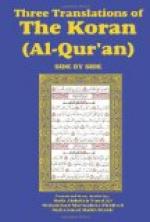42 In Solomon’s Books of Magic. This story has been supposed to be of Persian origin. See Hyde de Rel. Vet. Pers. ch. xii. But from a passage in the Midr. Abhkhir quoted in the Midr. Jalkut, ch. 44, and from a quotation in Maracci’s Prodr. iv. 82, Geiger infers that Muhammad has transferred to the time of Solomon, the Rabbinic traditions concerning the influence of angels upon men at the time of the Deluge. p. 106. “Babel is regarded by the Muslims as the fountain head of the science of magic. They suppose Haroot and Maroot to be two angels who, in consequence of their want of compassion for the frailties of mankind, were sent down to earth to be tempted. They both sinned; and being permitted to choose whether they would be punished now or hereafter, chose the former, and are still suspended by the feet at Babel in a rocky pit, and are the great teachers of magic.” (Lane on ch. iii. note 14 of the 1001 Nights.)
43 Raina, as pronounced in Hebrew, “our bad one;” but in Arabic, “look upon us,” a kind of salutation of the same signification as ondhorna, which, however, does not admit of any secondary bad sense like raina.
44 Comp. Sura xvi. 103; iv. 84. The Muslims admit that there are 225 verses cancelled by later ones. The doctrine of “abrogation” is taught in the Talmud. Thus Hilchoth Mamrim, ii. 1, 2, etc.
45 That is, does not weigh the evidence for Muhammad’s mission already given, but demands, as the Jews did, to see God himself.
46 In all Muhammadan countries the first time of prayer is the moghreb or sunset, or rather, four minutes later; the second the eshe, when it has become quite dark; the third the soobh or fegr, the daybreak; the fourth, doohr, or a little after noon, when the sun has begun to decline; the fifth, the asr, midway between noon and nightfall. The obligatory legal alms or impost are called, as here, zekah (lit. purity), the voluntary, sudackah. It is, however, left to the conscience of individuals to give and to apply them as they think fit.
47 The idolatrous Arabs.
48 If this verse is aimed at the Meccans who, in the 6th year of the Hejira, forbad Muhammad and his followers to enter the temple of Mecca in the expedition of Hodeibiya, it is misplaced here.
49 Abrogated by verse 139 below.
50 The Caaba.
51 Freytag (Einl. p. 339) says that there is no good reason for doubting that the Caaba was founded as stated in this passage. See note on Sura [xcvii.] iii. 90.
52 Deut. xviii. 15.
53 “At the time when our father Jacob quitted this world, be summoned his twelve sons and said to them, Hearken to your father Israel (Gen. xlix. 2). Have ye any doubts in your hearts concerning the Holy One, Blessed be He! They said, Hear, O Israel, our Father. As there is no doubt in thy heart, so neither is there in ours. For the Lord is our God, and He is one.” Midr. Rabbah on Gen. par. 98, and on Deut. par. 2. Comp. also Targ. Jer. on Deut. vi. 4. Tract. Pesachim, 56.




